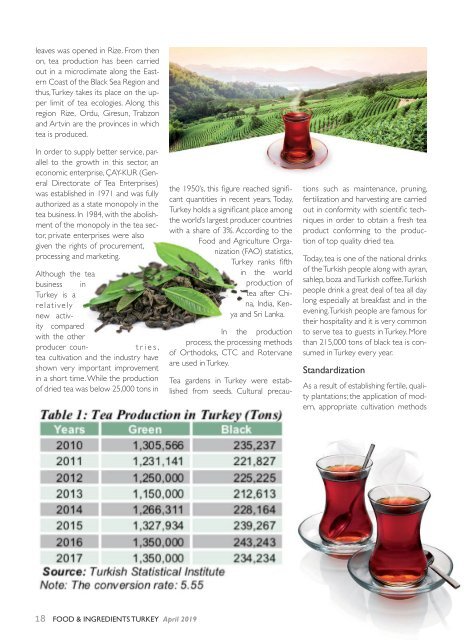Food & Ingredients Turkey April 2019
Food & Ingredients Turkey April 2019
Food & Ingredients Turkey April 2019
Create successful ePaper yourself
Turn your PDF publications into a flip-book with our unique Google optimized e-Paper software.
leaves was opened in Rize. From then<br />
on, tea production has been carried<br />
out in a microclimate along the Eastern<br />
Coast of the Black Sea Region and<br />
thus, <strong>Turkey</strong> takes its place on the upper<br />
limit of tea ecologies. Along this<br />
region Rize, Ordu, Giresun, Trabzon<br />
and Artvin are the provinces in which<br />
tea is produced.<br />
In order to supply better service, parallel<br />
to the growth in this sector, an<br />
economic enterprise, ÇAY-KUR (General<br />
Directorate of Tea Enterprises)<br />
was established in 1971 and was fully<br />
authorized as a state monopoly in the<br />
tea business. In 1984, with the abolishment<br />
of the monopoly in the tea sector,<br />
private enterprises were also<br />
given the rights of procurement,<br />
processing and marketing.<br />
Although the tea<br />
business in<br />
<strong>Turkey</strong> is a<br />
relatively<br />
new activity<br />
compared<br />
with the other<br />
producer coun-<br />
tries,<br />
tea cultivation and the industry have<br />
shown very important improvement<br />
in a short time. While the production<br />
of dried tea was below 25,000 tons in<br />
the 1950’s, this figure reached significant<br />
quantities in recent years. Today,<br />
<strong>Turkey</strong> holds a significant place among<br />
the world’s largest producer countries<br />
with a share of 3%. According to the<br />
<strong>Food</strong> and Agriculture Organization<br />
(FAO) statistics,<br />
<strong>Turkey</strong> ranks fifth<br />
in the world<br />
production of<br />
tea after China,<br />
India, Kenya<br />
and Sri Lanka.<br />
In the production<br />
process, the processing methods<br />
of Orthodoks, CTC and Rotervane<br />
are used in <strong>Turkey</strong>.<br />
Tea gardens in <strong>Turkey</strong> were established<br />
from seeds. Cultural precautions<br />
such as maintenance, pruning,<br />
fertilization and harvesting are carried<br />
out in conformity with scientific techniques<br />
in order to obtain a fresh tea<br />
product conforming to the production<br />
of top quality dried tea.<br />
Today, tea is one of the national drinks<br />
of the Turkish people along with ayran,<br />
sahlep, boza and Turkish coffee. Turkish<br />
people drink a great deal of tea all day<br />
long especially at breakfast and in the<br />
evening. Turkish people are famous for<br />
their hospitality and it is very common<br />
to serve tea to guests in <strong>Turkey</strong>. More<br />
than 215,000 tons of black tea is consumed<br />
in <strong>Turkey</strong> every year.<br />
Standardization<br />
As a result of establishing fertile, quality<br />
plantations; the application of modern,<br />
appropriate cultivation methods<br />
18 <strong>Food</strong> & <strong>Ingredients</strong> TURKEY <strong>April</strong> <strong>2019</strong>

















